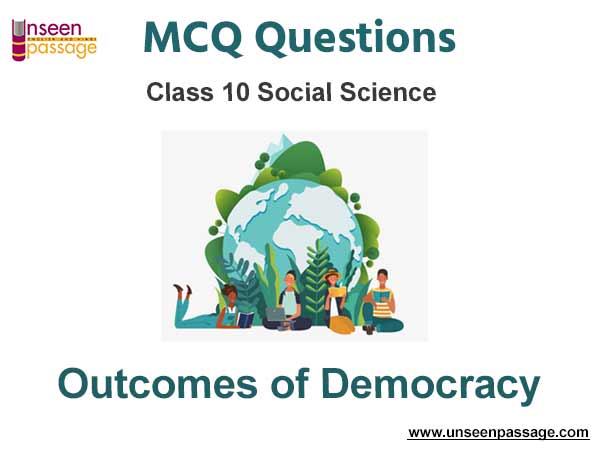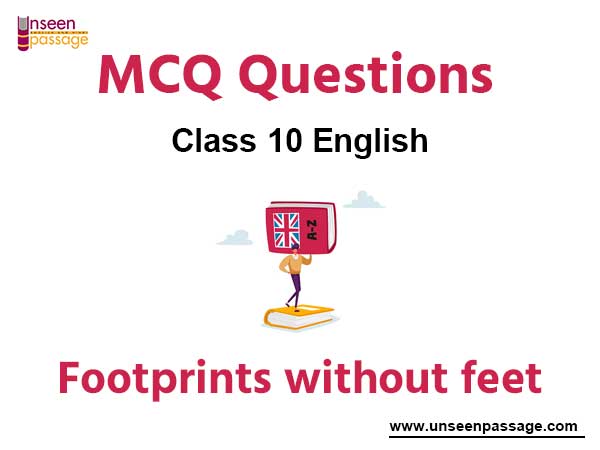Outcomes of Democracy MCQ Class 10 Social Science
Please refer to Chapter 7 Outcomes of Democracy MCQ Class 10 Social Science with answers below. These multiple-choice questions have been prepared based on the latest NCERT book for Class 10 Social Science. Students should refer to MCQ Questions for Class 10 Social Science with Answers to score more marks in Grade 10 Social Science exams. Students should read the chapter Outcomes of Democracy and then attempt the following objective questions.
MCQ Questions Class 10 Social Science Chapter 7 Outcomes of Democracy
The Outcomes of Democracy MCQ Class 10 Social Science provided below covers all important topics given in this chapter. These MCQs will help you to properly prepare for exams.
Question. A democratic government will take:
(a) Less time to follow procedures before arriving at a decision
(b) More time to follow procedures before arriving at a decision
(c) No time to follow procedures before arriving at a decision
(d) None of the above
Answer
B
Question. Most democracies fall short of election that provide:
(a) A fair change to everyone
(b) Fair rules to everyone
(c) Fair rights to everyone
(d) None of the above
Answer
A
Question. Democracies do not appear to be very successful in:
(а) Reducing economic inequalities
(b) Reducing political inequalities
(c) Reducing caste distinction
(d) All the above
Answer
A
Question. The poor constitute:
(а) A small proportion of our voters
(b) A large proportion of our voters
(c) Less amount of money
(d) None of the above
Answer
B
Question. No society can fully and permanently resolve conflicts:
(a) Among caste systems
(b) Rich and poor
(c) Among different groups
(d) None of the above
Answer
C
Question. Non-democratic regimes often turn a blind eye to:
(а) Caste differences
(b) Religious differences
(c) Social differences
(d) None of the above
Answer
C
Question. The type of governments which have slightly higher rate of economic growth are:
(а) Democracies
(b) Dictatorships
(c) Monarchy
(d) None of the above
Answer
B
Question. The factors which help in economic development are:
(a) Country’s population size
(b) Global situation
(c) Cooperation from other countries
(d) All the above
Answer
D
Question. Majority and minority opinions are:
(a) Permanent
(b) Not permanent
(c) Temporary
(d) None of the above
Answer
B
Question. Democracy remains democracy only as long as every citizen has a chance of being:
(a) Minority at some point of time
(b) Majority at some point of time
(c) Fully recognized
(d) None of the above
Answer
B
Question. The difference in the rates of economic developments between less developed countries with dictatorships and democracies is:
(a) Less
(b) More
(c) Negligible
(d) None of the above
Answer
C
Question. Democracies are based on:
(а) Social equality
(b) Caste equality
(c) Economic equality
(d) Political equality
Answer
D
Question. Democracy stands much superior to any other form of government in promoting:
(а) Dignity and freedom of the individual
(b) Freedom of the people
(c) Rights of people
(d) None of the above
Answer
A
Question. The most distinctive feature of democracy is that:
(a) It is the right government
(b) It considers rich and poor equal
(c) Its examinations never gets over
(d) None of the above
Answer
C
Question. Democratic government is:
(a) Right choice of government
(b) Is free of all evils
(c) People’s own government
(d) None of the above
Answer
C
Fill in the blanks
Question. Non-democratic rulers do not have to bother about deliberation in ……………………… or worry about majorities and public opinion.
Answer
assemblies
Question. Democracy ensures that decision making will be based on ……………………… and procedures.
Answer
accountable
Question. Democracy is not simply ruled by majority ……………………… .
Answer
opinion
Question. Majority and minority opinions are not ……………………… .
Answer
permanent
Question. It is right to except democracy to produce a government that follows procedures and is ……………………… to the people.
Answer
norms
Question. Most democracies fall short of ……………………… that provide a fair chance to everyone and in subjecting every decision to public debate.
Answer
elections
Question. We cannot say that democracy is a guarantee ……………………… of development.
Answer
economic
Question. It is reasonable to except democracies to reduce economic ……………………… .
Answer
disparities
Write true (T) or false (F)
Question. It is better to prefer democracy than dictatorship because it has several positive outcomes.
Answer
True
Question. Democracies are not based on political equality.
Answer
False
Question. People m several poor countries are now dependent on the rich countries even for medicines.
Answer
False
Question. Democracies usually develop a procedure to conduct their competition.
Answer
True
Question. Our interest is and fascination for democracy often pushes us into taking a position that democracy can address all socio-economic and religious problems.
Answer
False
Question. Democracy is based on the idea of trust and negotiation.
Answer
False
Question. Democracies have had greater success in setting up regular and free elections and in setting up conditions for open public debate.
Answer
True
Question. Democratic government have a very good record when it comes to sharing information with citizens.
Answer
False
Question. Majority and minority opinions are permanent.
Answer
False
Question. Democracy remains a democracy only as long as every citizen has a chance of being in majority at some point of time.
Answer
True
Question. Democracies do not frustrate the needs of the people and often ignore the demands of a majority of its population.
Answer
False
Question. People, today, never wish to be ruled by representatives elected by them.
Answer
False
Question. Democracy enchances the dignity of the individual.
Answer
True
Question. Democracy does not allows room to correct mistakes.
Answer
False
Question. Democracy’s ability to generate its own support is itself an outcome that cannot be ignored.
Answer
True
Match the Following
| Column-A | Column-B |
| 1. Democracy promotes equality | (a) idea of deliberation and negotiation |
| 2. Democracy is based on the | (b) political equality |
| 3. Democracy allows room | (c) to resolve conflicts |
| 4. Democracies are based on | (d) among citizens |
| 5. Democracy provides a method | (e) to correct mistake |
Answer
1. → (d), 2. → (a), 3. → (e), 4. → (b), 5. → (c)

We hope you liked the above Outcomes of Democracy MCQ Class 10 Social Science. In case you have any questions please put them in the comments box below and our teachers will provide you a response.


